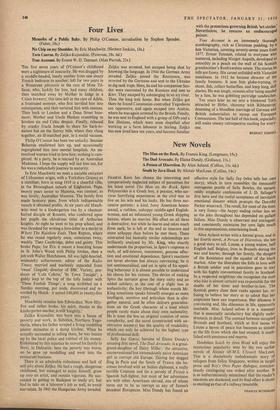New Novels
FRANCIS KING has chosen the interesting and comparatively neglected subject of parasitism for his latest novel The Man on the Rock. Spiro Polymerides is a Greek boy, a peasant, who sur- vives horrifying experiences in the civil war to live on his wits and his looks. He has three suc- cessive patrons : a kind, fussy American homo- sexual, a ruthless, unhappy middle-aged English- woman, and an infatuated young Greek shipping heiress, whom he marries. His effect on all three is destructive; but while he learns and takes much from each, he is left at the end as insecure and more unhappy than before he met them. These _contrasted but basically similar relationships are brilliantly analysed by Mr. King, who exactly understands the proportion, in Spiro's response to each, of self-interest, resentment, genuine affec- tion and emotional dependence. Spiro's reactions are never obvious but always convincing; he is not sentimentalised, and yet in spite of his appal- ling behaviour it is almost possible to understand his charm for his victims. The device of making Spiro the narrator gives the story unity and an added subtlety, at the cost of a slight loss in authenticity; the boy (through whose mouth Mr. King sometimes speaks himself) emerges as more intelligent, sensitive and articulate than is alto- gether natural, and he often delivers generalisa- tions on the Greek character of a kind which people rarely make about their own nationality. He is none the less an original creation of some complexity, and the novel (constructed with un- obtrusive mastery) has the quality of readability which can only be achieved by the highest type of professional skill.
Sally Jay Gorce, heroine of Elaine Dundy's amusing first novel, The Dud Avocado, is a great- grand-daughter of Daisy Miller : the attractive, unconventional but tremendously naive American girl in corrupt old Europe. During her dogged fling in Paris and the South of France she be- comes involved with an Italian diplomat, a really terrible Contessa and (in a parody of Fiesta) a Spanish bull-fighter, but most of her adventures are with other. Americans abroad, one of whom turns out to be as corrupt as any of James's decadent Europeans. Miss Dundy has found an
effective style for Sally Jay (who tells her own story), which in turn resembles the innocently outrageous prattle of Sally Bowles, the earnest, oddly emphatic confessions of J. D. Salinger's first hero and the rueful acceptance of inevitable emotional disaster which prompts the Dorothy Parker wisecrack. The result, for most of the time. is very funny—the happy ending rather less so, as the joke throughout has depended on gallant failure. Miss Dundy is observant and astringent. and consistently maintains her own light touch in this unpretentious, entertaining book.
Alice Acland writes with a formal grace, and in her fourth novel, A Person of Discretion, she has a good story to tell. Louise, a young widow, half English half Belgian, lives in Brussels during the war and knows, through her family, the dangers of the Resistance and the squalor of the black market. After the liberation she falls in love with a British soldier and in peacetime goes to stay with his highly conventional family in Scotland. In a respected neighbour she recognises the man who (she is almost certain) was responsible for the deaths of her sister and brother-in-law. The Scottish gentry close their ranks against her, re. fusing to believe her story or to admit that her suspicions have any importance. Her dilemma is convincing and, like dilemmas in life, apparently insoluble. Miss Acland solves it in a mannner that is essentially satisfactory but slightly melo- dramatic in detail. The contrast between occupied Brussels and Scotland, which at first seems to Louise a haven of peace but 'becomes as sinister as the life from which she had escaped, is estab- lished with assurance and reserve.
Doubtless South by Java Head will enjoy the mysterious popularity won by the two earlier novels of Alistair (H.M.S. Ulysses) MacLean. This is a shamelessly melodramatic story of refugees from fallen Singapore, written in turgid prose and Boy's Own Paper dialogue, conscien• tiously cataloguing one ordeal after another. It is so indiscriminately sensational that the reader's reactions are deadened, and its final effect is about as exciting as that of a railway timetable.
FRANCIS WYNDHAM






































 Previous page
Previous page